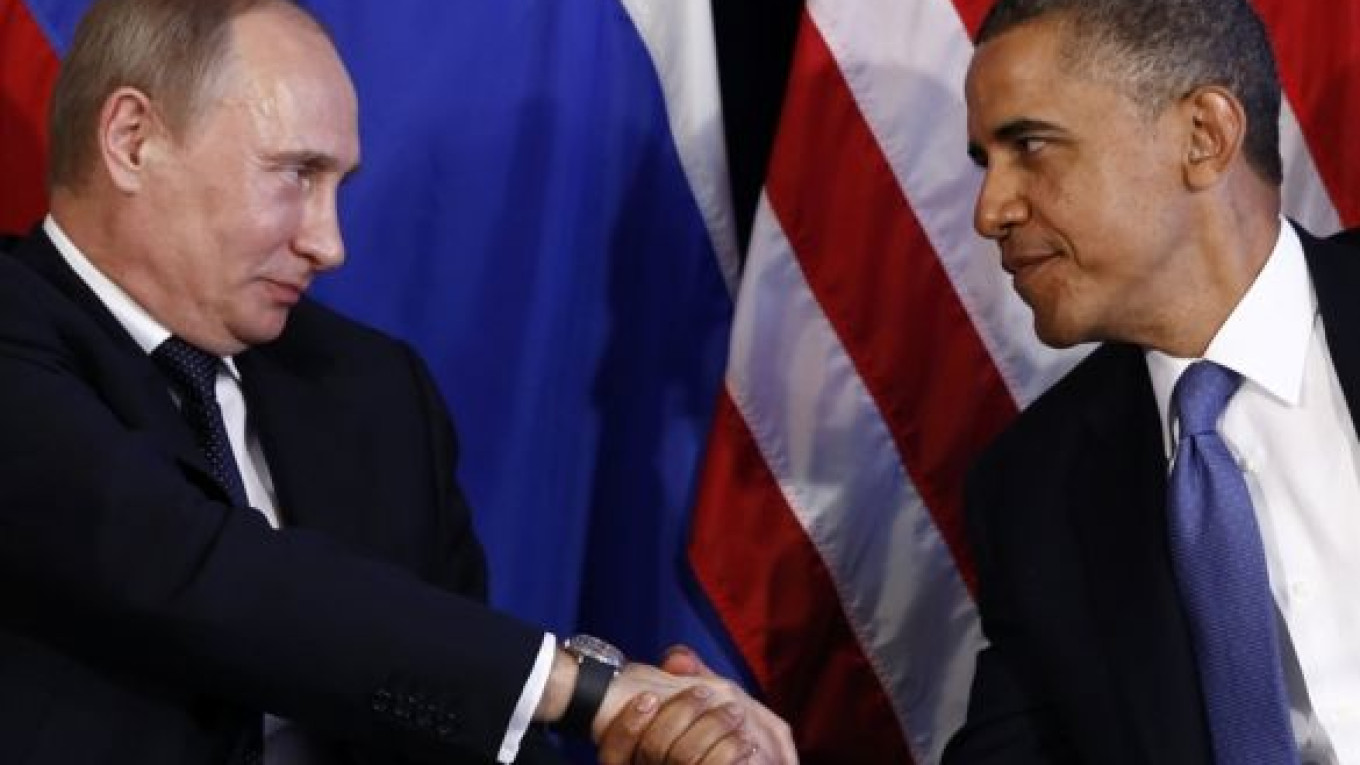The Kremlin said the United States has sent Russia a "positive signal" by dispatching a high-profile delegation to Moscow headed by U.S. National Security Adviser Thomas Donilon, who delivered a letter Monday with "concrete measures" on missile defense, nuclear arms reduction and trade.
The meeting occurred amid ongoing strains in U.S.-Russia relations marked most recently by an exchange over the weekend of blacklists of officials banned from entering each country, and by a series of scandals over adoptions of Russian children by U.S. parents.
President Vladimir Putin's official spokesman Dmitry Peskov condemned the U.S. for allegedly initiating the tit-for-tat exchange with the Magnitsky blacklist, calling it "a blow to bilateral relations" in an interview broadcast late Sunday.
He added that the move comes at a time when "regional conflicts [and] potential new conflicts dictate the need for rapprochement between Russia and America, since these are two countries that bear responsibility for global stability."
Donilon, along with U.S. Assistant Secretary for Arms Control, Verification and Compliance Rose Gottemoeller and Undersecretary of Defense for Policy James Miller, arrived in Moscow on Monday for a meeting with top Russian officials including President Vladimir Putin, secretary of the Security Council Nikolai Patrushev and Foreign Minister Sergei Lavrov.
Alexei Pushkov, head of the State Duma's International Affairs Committee, said Sunday on Twitter that Donilon's visit was not "at the best time," and that he'd be "the first to feel the effect of the 'blacklists.'"
U.S. officials offer specific measures to smooth relations in a visit to Moscow.
Despite the deteriorating atmosphere, the U.S. administration is still trying to reach out to Russia and, according to Lavrov, "has promised to deal with the headaches" between the two countries, Interfax reported after Monday's meeting.
U.S. National Security Council spokeswoman Caitlin Hayden called Monday's discussions "comprehensive and constructive" in a terse statement released by the White House.
All the analysts and officials interviewed by The Moscow Times agreed that Donilon's trip was a positive step that could help initiate a recovery in U.S.-Russia ties.
"The U.S. does not feel it can support its policy unilaterally, so it has to reach out to Russia," Pushkov said Monday in a phone interview. "Obama had to wait a few months to formulate concrete proposals in the area of missile defense," he added.
Nevertheless, the initiatives put forward by the White House could be stalled by an increasingly hawkish U.S. Congress, Pushkov said.
According to Valery Garbuzov, deputy director of the Moscow Institute for U.S. and Canadian Studies, although the U.S. president does not want to escalate tensions with Russia, he has less autonomy in deciding policy than the Russian side may realize.
? "Obama is the one least interested in the current strain in ties between the two countries. But Russian politicians do not realize how U.S. foreign policy is formulated," he said.
"Unlike in Russia, in the U.S., Congress can squeeze the president's throat. If Russia perceives U.S. presidents as autocrats, it won't get anywhere," Garbuzov said.
According to Yury Ushakov, the Kremlin's foreign policy adviser, the Kremlin is well aware that U.S. policy toward Russia is not monolithic. While the Obama administration is sending positive signals, he said, it still "does not want to rein in several 'russophobes' who are throwing a wrench into our cooperation," Interfax reported.
Echoing his sentiments, Garbuzov noted that Obama couldn't control what congressmen and senators say or do and that this miscomprehension on Russia's part is precisely what keeps Russia-U.S. relations at a standstill.
Pushkov said the Russian government realizes that the U.S. foreign policy decision-making process is different but that Russian public opinion puts its policymakers under scrutiny as well.
The foreign policy issues that the two sides have a common interest in, including North Korea's nuclear ambitions, could be a good place to start, Ushakov said, noting that the two sides demonstrated "common ground" on that issue.
Donilon's visit also served to set the stage for more serious talks between Obama and Putin planned during the G8 Summit in Northern Ireland on June 17-18. Those talks will be followed by large-scale negotiations during the G20 meeting in St. Petersburg on Sept. 5-6.
Contact the author at i.nechepurenko@imedia.ru
Related articles:
A Message from The Moscow Times:
Dear readers,
We are facing unprecedented challenges. Russia's Prosecutor General's Office has designated The Moscow Times as an "undesirable" organization, criminalizing our work and putting our staff at risk of prosecution. This follows our earlier unjust labeling as a "foreign agent."
These actions are direct attempts to silence independent journalism in Russia. The authorities claim our work "discredits the decisions of the Russian leadership." We see things differently: we strive to provide accurate, unbiased reporting on Russia.
We, the journalists of The Moscow Times, refuse to be silenced. But to continue our work, we need your help.
Your support, no matter how small, makes a world of difference. If you can, please support us monthly starting from just $2. It's quick to set up, and every contribution makes a significant impact.
By supporting The Moscow Times, you're defending open, independent journalism in the face of repression. Thank you for standing with us.
Remind me later.


